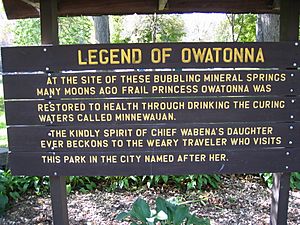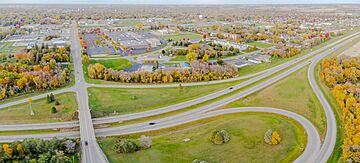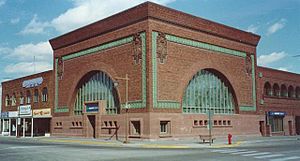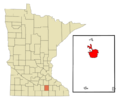Owatonna, Minnesota facts for kids
Quick facts for kids
Owatonna
|
|
|---|---|
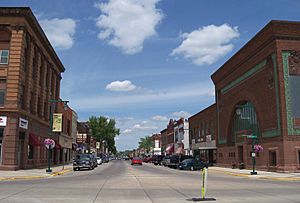
Downtown Owatonna
|
|
| Nickname(s):
O-Town
|
|
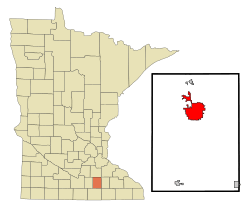
|
|
| Country | United States |
| State | Minnesota |
| County | Steele |
| Settled | 1854 |
| Platted | September 1855 |
| Incorporated (town) | August 9, 1858 |
| Incorporated (city) | February 23, 1865 |
| Named for | Straight River |
| Government | |
| • Type | Representative council |
| Area | |
| • Total | 15.20 sq mi (39.36 km2) |
| • Land | 15.11 sq mi (39.14 km2) |
| • Water | 0.09 sq mi (0.22 km2) |
| Elevation | 1,132 ft (345 m) |
| Population
(2020)
|
|
| • Total | 26,420 |
| • Estimate
(2022)
|
26,470 |
| • Density | 1,748.16/sq mi (674.98/km2) |
| Time zone | UTC-6 (Central) |
| • Summer (DST) | UTC-5 (CDT) |
| ZIP code |
55060
|
| Area code(s) | 507 |
| FIPS code | 27-49300 |
| GNIS feature ID | 2396114 |
Owatonna is a city in Minnesota, United States. It is the main city and county seat of Steele County. In 2020, about 26,420 people lived here. Owatonna is famous for hosting the Steele County Free Fair every August.
Major roads like Interstate 35 and U.S. Highways 14 and 218 pass through the city.
Contents
History of Owatonna
Owatonna was first settled in 1853. It grew around the Straight River. The city's name comes from the Dakota language, Wakpá Owóthaŋna, which means Straight River.
A popular story says the city was named after "Princess Owatonna." She was the daughter of a local Native American Chief. The story says she was healed by special spring waters nearby. These waters were thought to have iron and sulfur. The city was officially started in 1854. It became a town in 1858 and a city in 1865.
Early Settlers and Growth
In 1856, Josef Karel Kaplan came to Owatonna from Bohemia. He bought land near the town. Kaplan wrote that Owatonna had only 50 small homes then. But he believed it would grow quickly. He was right! Owatonna grew to 1,500 people in just five years.
Kaplan wrote letters about the area. He described seeing Native American people. He said they had "tough constitutions" and "good dispositions." He also wrote that if there were battles, white settlers were often to blame. In 1866, Kaplan helped start the Catholic cemetery. A year later, he helped create the Bohemian National Cemetery.
Kaplan's Woods Parkway
Part of the land Josef Kaplan owned is now Kaplan's Woods. This area is a beautiful nature preserve. The State of Minnesota first made it a state park. Later, it became a city park.
Kaplan's Woods Parkway has over 6 miles (9.7 km) of trails. You can hike or cross-country ski there. Nearly 2 miles (3.2 km) of the trails are paved. This makes them easy for everyone to use. The parkway also includes Lake Kohlmier, a 35-acre (14 ha) lake.
The State School for Children
The Minnesota State Public School for Dependent and Neglected Children opened in 1886. This school took in children who were orphans or needed care. It taught them important skills and discipline. Children who passed away at the school were buried in the Children's Cemetery.
In 1945, the orphanage closed. The school then became the Owatonna State School in 1947. This new school helped young people with developmental disabilities. It offered them academic and job training. The Owatonna State School closed in 1970.
Today, the city uses the old school buildings for its offices. This area is now called "West Hills." Many non-profit groups also have offices there.
Recent School Improvements
In 2015, the Owatonna Public School District voted for big changes. They approved $77.9 million to fix school buildings. This money helped update safety features. It also made schools less crowded. All these projects were finished by September 2018.
In 2019, voters approved more money to build a new Owatonna Senior High School. This new high school is 317,000 square feet (29,450 m²) big. It opened to students on September 5, 2023. A public grand opening was held later that month.
Steele County Historical Society
The Steele County Historical Society works to save the history of Steele County. It shares stories and helps people connect with the past. The society started in 1949.
In 1962, they began building the Village of Yesteryear. This is a pioneer village at the fairgrounds. It has old buildings that were moved there. New museum buildings have also been built on the site.
Geography and Climate
Owatonna covers about 14.62 square miles (37.87 km²). Most of this area is land. The city's oldest part is near the Straight River. It also extends towards Maple Creek.
The city has grown in all directions. It now sits on both sides of the river. Important natural spots include Kaplan's Woods. This is a nature preserve on the city's southern edge. Cinder Hill is a steep hill that athletes use for training. The Straight River dam was once used for a mill. Now it has a fish ladder. Forest Hill Cemetery is an old, wooded cemetery. It marks the edge of the city's older areas.
Climate in Owatonna
Owatonna has a climate with warm summers and cold winters. Here is some information about the weather:
| Climate data for Owatonna, Minnesota, 1991–2020 normals, extremes 1961–present | |||||||||||||
|---|---|---|---|---|---|---|---|---|---|---|---|---|---|
| Month | Jan | Feb | Mar | Apr | May | Jun | Jul | Aug | Sep | Oct | Nov | Dec | Year |
| Record high °F (°C) | 58 (14) |
65 (18) |
81 (27) |
92 (33) |
98 (37) |
102 (39) |
102 (39) |
102 (39) |
98 (37) |
93 (34) |
78 (26) |
67 (19) |
102 (39) |
| Mean maximum °F (°C) | 41.5 (5.3) |
46.3 (7.9) |
64.0 (17.8) |
79.2 (26.2) |
88.1 (31.2) |
92.5 (33.6) |
92.5 (33.6) |
90.6 (32.6) |
88.1 (31.2) |
81.5 (27.5) |
63.8 (17.7) |
46.8 (8.2) |
95.2 (35.1) |
| Mean daily maximum °F (°C) | 22.2 (−5.4) |
26.8 (−2.9) |
39.6 (4.2) |
55.3 (12.9) |
67.7 (19.8) |
78.3 (25.7) |
81.7 (27.6) |
79.4 (26.3) |
72.8 (22.7) |
58.7 (14.8) |
41.6 (5.3) |
27.9 (−2.3) |
54.3 (12.4) |
| Daily mean °F (°C) | 13.7 (−10.2) |
18.0 (−7.8) |
30.7 (−0.7) |
44.8 (7.1) |
57.1 (13.9) |
68.1 (20.1) |
71.8 (22.1) |
69.5 (20.8) |
62.1 (16.7) |
48.3 (9.1) |
33.3 (0.7) |
20.3 (−6.5) |
44.8 (7.1) |
| Mean daily minimum °F (°C) | 5.1 (−14.9) |
9.2 (−12.7) |
21.8 (−5.7) |
34.2 (1.2) |
46.6 (8.1) |
58.0 (14.4) |
62.0 (16.7) |
59.6 (15.3) |
51.4 (10.8) |
37.9 (3.3) |
25.1 (−3.8) |
12.7 (−10.7) |
35.3 (1.8) |
| Mean minimum °F (°C) | −17.7 (−27.6) |
−12.0 (−24.4) |
−1.5 (−18.6) |
18.6 (−7.4) |
31.2 (−0.4) |
44.2 (6.8) |
51.0 (10.6) |
48.9 (9.4) |
35.4 (1.9) |
23.0 (−5.0) |
7.2 (−13.8) |
−10.2 (−23.4) |
−20.8 (−29.3) |
| Record low °F (°C) | −35 (−37) |
−34 (−37) |
−32 (−36) |
0 (−18) |
12 (−11) |
33 (1) |
42 (6) |
36 (2) |
23 (−5) |
13 (−11) |
−15 (−26) |
−32 (−36) |
−35 (−37) |
| Average precipitation inches (mm) | 0.87 (22) |
0.89 (23) |
1.99 (51) |
3.18 (81) |
4.61 (117) |
5.28 (134) |
4.79 (122) |
4.84 (123) |
3.80 (97) |
2.48 (63) |
1.65 (42) |
1.08 (27) |
35.46 (902) |
| Average snowfall inches (cm) | 9.5 (24) |
10.2 (26) |
6.8 (17) |
2.6 (6.6) |
0.5 (1.3) |
0.0 (0.0) |
0.0 (0.0) |
0.0 (0.0) |
0.0 (0.0) |
0.3 (0.76) |
3.1 (7.9) |
11.2 (28) |
44.2 (111.56) |
| Average precipitation days (≥ 0.01 in) | 6.9 | 5.6 | 7.7 | 10.6 | 12.4 | 11.9 | 9.6 | 9.7 | 8.6 | 8.9 | 6.1 | 7.1 | 105.1 |
| Average snowy days (≥ 0.1 in) | 4.9 | 3.9 | 2.5 | 0.8 | 0.0 | 0.0 | 0.0 | 0.0 | 0.0 | 0.3 | 1.8 | 4.6 | 18.8 |
| Source 1: NOAA | |||||||||||||
| Source 2: National Weather Service | |||||||||||||
People of Owatonna
| Historical population | |||
|---|---|---|---|
| Census | Pop. | %± | |
| 1860 | 609 | — | |
| 1870 | 2,070 | 239.9% | |
| 1880 | 3,161 | 52.7% | |
| 1890 | 3,849 | 21.8% | |
| 1900 | 5,561 | 44.5% | |
| 1910 | 5,658 | 1.7% | |
| 1920 | 7,252 | 28.2% | |
| 1930 | 7,654 | 5.5% | |
| 1940 | 8,694 | 13.6% | |
| 1950 | 10,191 | 17.2% | |
| 1960 | 13,409 | 31.6% | |
| 1970 | 15,341 | 14.4% | |
| 1980 | 18,632 | 21.5% | |
| 1990 | 19,386 | 4.0% | |
| 2000 | 22,434 | 15.7% | |
| 2010 | 25,599 | 14.1% | |
| 2020 | 26,420 | 3.2% | |
| 2022 (est.) | 26,470 | 3.4% | |
| U.S. Decennial Census 2020 Census |
|||
In 2010, Owatonna had 25,599 people. There were 10,068 homes. Most people (91.2%) were White. About 3.8% were African American. 7.3% of the population was Hispanic or Latino.
The average age in Owatonna was 37.2 years old. About 26.9% of the people were under 18. And 13.8% were 65 or older. The city had slightly more females (51.2%) than males (48.8%).
Owatonna's Economy
Owatonna is a busy place for business in Southern Minnesota. It has many different types of industries. Federated Insurance is the biggest employer. It has over 1,500 employees. Viracon is another large employer with over 1,400 workers. Both companies have their main offices in Owatonna.
Other big employers include Bosch, Jostens, and Gopher Sport. Also, Brunswick Corporation (Cybex International) and Daikin Industries are here. The local school district (ISD 761) and hospitals also employ many people.
Arts and Culture
In 1974, the city bought the old campus of the Minnesota State Public School for Dependent and Neglected Children. This area is now called West Hills. It is used for city offices and many non-profit groups. The Owatonna Arts Center is also located there. The Little Theatre of Owatonna has been performing at Merrill Hall in West Hills since 1966.
A funny, long-running joke called Pesky Pants happened in Owatonna from 1965 to 1989.
Places to Visit
National Farmers Bank
In downtown Owatonna, you can see the National Farmer's Bank. It is famous for its unique design. The building was finished in 1908. It was designed by Louis Sullivan. This style is called Prairie School architecture.
The bank has beautiful gold leaf arches and stained-glass windows. It also has special art designs. All these features are still in great condition. The bank is a national landmark. It is listed on the National Register of Historic Places. Today, it is a branch of Wells Fargo Bank.
State School Museum
The State School Museum is at West Hills. It is on the grounds of the old Minnesota State School for Dependent and Neglected Children. This museum helps tell the story of the children who lived there.
Sports in Owatonna
Owatonna has a junior hockey team called the Steele County Blades. They play at the Four Seasons Center. The team is part of the Minnesota Junior Hockey League.
Education in Owatonna
Independent School District No. 761 provides public education in Owatonna.
Public Schools
Elementary Schools
- Lincoln Elementary, for grades K-5
- McKinley Elementary, for grades K-5
- Washington Elementary, for grades K-5
- Wilson Elementary, for grades K-5
Middle School
- Owatonna Middle School, for grades 6-8
High School
- Owatonna Senior High School, for grades 9-12
- Owatonna Alternative Learning Center (ALC), for grades 7-12
Private Schools
- Owatonna Christian School, for grades K-12
- St. Marys Catholic School, for grades K-8
Higher Education
- Riverland Community College
Past Schools
- "Old" Lincoln Elementary School (1885-1951)
- Roosevelt Elementary School (1919-1980)
- Jefferson Elementary School (early 1900s-1970)
- First Owatonna High School (1871-1882)
- Second Owatonna High School (1883-1921)
- Third Owatonna High School (1921-2023)
- Minnesota State School for Dependent and Neglected Children (1887-1945)
- Owatonna State School (1947-1970)
- Willow Creek Intermediate School (1990-2017)
- Owatonna Junior High school (1965-2017)
Owatonna Art Education Project
The Owatonna Art Education Project was a special program in Owatonna. It focused on teaching art.
Media and Entertainment
Radio Stations
Owatonna has several local radio stations.
AM Radio Stations
| Frequency | Call sign | Name | Format | Owner |
|---|---|---|---|---|
| 920 | KDHL | The Mighty 920 | Classic Country | Townsquare Media |
| 1170 | KFOW | Sports radio | Linder Radio Group | |
| 1390 | KRFO | Oldies | Townsquare Media |
FM Radio Stations
| Frequency | Call sign | Name | Format | Owner |
|---|---|---|---|---|
| 92.1 | KRUE | KRUE Country 92.1 | Country | Linder Radio Group |
| 93.5 | K228DR (KJLY Translator) |
Christian | Minn-Iowa Christian Broadcasting | |
| 100.9 | KOWZ | Adult Contemporary | Linder Radio Group | |
| 103.9 | K280EC (KNGA Translator) |
MPR News | NPR | Minnesota Public Radio |
| 104.9 | KRFO | Country | Townsquare Media | |
| 105.7 | K289AE (KGAC Translator) |
Classical MPR | Classical | Minnesota Public Radio |
| 106.3 | K292GU (KFOW Translator) |
Sports radio | Linder Radio Group | |
| 107.5 | KBGY (KLCI Simulcast) |
BOB-FM | Classic country | Milestone Radio II, LLC |
Movies Filmed in Owatonna
Parts of the 1995 movie Angus were filmed in Owatonna. This included scenes at Owatonna Senior High School. The school's football team and marching band were also in the movie.
The 2014 silent film The Root of Evil was also shot in Owatonna. Many scenes were filmed at Owatonna Senior High School. Over 60 high school students helped make this movie. It won 10 awards at film festivals around the world.
Transportation
Local bus service in Owatonna is called SMART. SMART has one main bus route. It also offers special transportation services.
Famous People from Owatonna
Many interesting people have connections to Owatonna:
- Ken Christianson, artist and musician
- Masanori Mark Christianson, art director and musician
- Lillian Colton, a unique artist who uses crops
- Casey Driessen, a talented fiddler
- Arthur Fry, who helped create the Post-it Note
- Mike Hegstrand, a professional wrestler
- Don Laughlin, who founded the town of Laughlin, Nevada
- E.G. Marshall, an actor known for 12 Angry Men
- Craig Minowa, lead singer of the band Cloud Cult
- Tom Moore, an NFL coach
- Sean Tillman a.k.a. Har Mar Superstar, a musician
- Travis Wiuff, an MMA fighter
- Adam Young, a.k.a. Owl City, a musician who held a concert here
Images for kids
See also
 In Spanish: Owatonna (Minnesota) para niños
In Spanish: Owatonna (Minnesota) para niños
 | Calvin Brent |
 | Walter T. Bailey |
 | Martha Cassell Thompson |
 | Alberta Jeannette Cassell |


